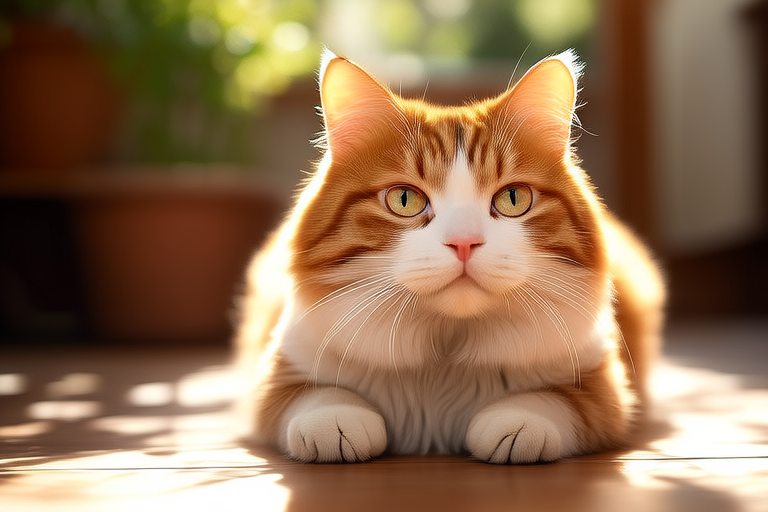The Ultimate Guide to Caring for Your Lovable Orange Tabby
Welcome to the world of owning an orange tabby! These beautiful felines are known for their striking appearance and loving personalities. As an owner, you have the unique opportunity to provide a nurturing environment that will help your cat thrive. This guide will cover everything from dietary needs to common health issues, ensuring you can give the best care possible for your orange tabby.
Dietary Needs
Feeding your orange tabby the right diet is crucial for their overall health and well-being. High-quality cat food, whether dry or wet, should be chosen based on your pet’s age, weight, and activity level. Always consult with your veterinarian before making any changes to your cat’s diet. Ensure that the food contains high-quality proteins, essential fatty acids, vitamins, and minerals. Avoid feeding them table scraps, as these can lead to obesity and other health problems.
Water is also an important part of your orange tabby’s diet. Make sure they always have access to fresh, clean water. Some cats prefer running water, so consider investing in a water fountain designed for pets. Monitor their eating habits and adjust portion sizes as needed to maintain a healthy weight.
Grooming Tips
Orange tabbies are typically short-haired cats, but they still require regular grooming to keep their coats shiny and healthy. Brushing your cat at least once a week helps remove loose hair and prevents hairballs. Use a soft-bristled brush or a rubber glove to gently stroke their fur. This also provides a great opportunity to bond with your cat and check for any signs of skin irritation or parasites.
Bathing your orange tabby is usually unnecessary unless they get into something particularly messy. If you do need to bathe them, use a gentle, pH-balanced shampoo specifically formulated for cats. Be sure to thoroughly rinse all soap from their coat to avoid irritation. After bathing, dry them off with a towel and let them air-dry in a warm room.
Trimming your cat’s nails regularly is another important grooming task. Invest in a good quality nail clipper and trim the tips of their claws every few weeks. Be careful not to cut into the quick, which can cause bleeding and discomfort. If you’re unsure about how to do this, ask your veterinarian or a professional groomer for guidance.
Exercise Requirements
While orange tabbies may seem lazy, they still need regular physical activity to stay healthy and happy. Encourage playtime with interactive toys such as feather wands, laser pointers, or puzzle feeders. Rotate toys to keep things interesting and prevent boredom. Play sessions can also help strengthen the bond between you and your cat.
Provide your orange tabby with vertical spaces like cat trees, shelves, or window perches where they can climb and explore. Climbing is a natural behavior for cats and provides both mental and physical stimulation. Consider creating a scratching post or installing wall-mounted scratchers to give them an appropriate outlet for scratching.
Common Health Issues
Like all cats, orange tabbies can be prone to certain health issues. Obesity is one of the most common concerns, especially if they don’t get enough exercise or consume too many calories. Keep an eye on your cat’s weight and adjust their diet and activity levels accordingly.
Dental disease is another issue that can affect your orange tabby. Regular brushing with a toothbrush designed for cats can help prevent plaque buildup and gum disease. Schedule routine dental checkups with your veterinarian to catch any potential problems early.
Hypertrophic cardiomyopathy (HCM) is a genetic heart condition that can affect orange tabbies. While there is no cure, early detection through regular veterinary exams can help manage the condition and improve your cat’s quality of life. Be aware of symptoms such as lethargy, difficulty breathing, or sudden weakness, and seek immediate medical attention if you notice any of these signs.
Behavioral Traits
Orange tabbies are generally affectionate and playful, often forming strong bonds with their owners. They enjoy being around people and may follow you from room to room, seeking attention and companionship. However, they can also be independent and may prefer some alone time.
These cats are known for their curiosity and intelligence. They often enjoy solving puzzles or playing games that challenge their minds. Providing mentally stimulating activities can help prevent boredom and destructive behaviors. Consider setting up a “catio” or supervised outdoor enclosure where they can safely explore and engage with the environment.
Orange tabbies can be vocal, especially when they want attention or food. While some owners find this endearing, excessive meowing can become annoying. If your cat is excessively vocal, try to identify the underlying cause and address it. Redirect their attention with toys or treats, or provide additional outlets for their energy.
Advice on Bonding with Your Orange Tabby
Bonding with your orange tabby requires patience, consistency, and understanding. Spend quality time together each day by playing, grooming, and simply sitting with them. Offer praise and positive reinforcement for good behavior, and avoid punishment, which can damage trust.
Create a safe and comfortable environment for your cat. Provide cozy hiding spots, such as cardboard boxes or tunnels, where they can retreat when feeling overwhelmed. Establish routines, such as feeding times and play sessions, to help your cat feel secure and loved.
Respect your orange tabby’s boundaries and individuality. Some cats are more affectionate than others, and that’s okay. Give them space when they need it, and gradually build trust over time. With patience and love, you’ll develop a strong and lasting bond with your beloved orange tabby.
In conclusion, caring for an orange tabby is a rewarding experience that requires dedication and effort. By providing proper nutrition, grooming, exercise, and attention, you can ensure that your cat lives a long, healthy, and happy life. Remember to consult with your veterinarian regularly and address any concerns promptly. With the right care and love, your orange tabby will bring joy and companionship to your home for years to come.
